
Robert De Niro and Prostate Cancer: How He Went Against, How He Survived, and More
Robert De Niro, an iconic figure in American cinema, is renowned for his transformative roles in films such as “Taxi Driver,” “Raging Bull,” and “The Godfather Part II.” His legendary career spans over five decades, earning him numerous accolades, including two Academy Awards. In 2003, De Niro revealed his prostate cancer diagnosis, a pivotal moment that highlighted the importance of health awareness. Prostate cancer is the second most common cancer among men, with one in eight expected to be diagnosed in their lifetime, according to American Cancer Society. De Niro’s public advocacy emphasizes early detection and treatment, stating,
“I want to raise awareness about this disease and the importance of regular check-ups.”
His personal journey through diagnosis and treatment has inspired many, illustrating that even the most celebrated individuals face health challenges. By sharing his story, De Niro encourages open discussions about men’s health and the critical need for proactive healthcare measures.

How Did Robert De Niro Get Diagnosed with Prostate Cancer?
Robert De Niro’s prostate cancer diagnosis unfolded through a series of routine health checks that underscore the critical role of early detection. In 2003, during a regular check-up, doctors identified elevated PSA (prostate-specific antigen) levels, prompting further investigation. This proactive approach allowed for timely diagnosis, crucial in treating prostate cancer effectively.
De Niro emphasized the importance of these routine health screenings, which many men often overlook. He remarked, “Regular check-ups saved my life,” highlighting how early detection can lead to better treatment outcomes.
Symptoms
Prostate cancer often presents with a range of symptoms, particularly as the disease progresses. The most common symptoms include frequent urination, which is especially noticeable at night (nocturia) (American Cancer Society, 2022). Men may also experience difficulty starting or stopping urination, with a weak or interrupted urine flow. Painful urination can occur, accompanied by discomfort or a burning sensation. Some individuals report blood in their urine or semen, known as hematuria and hematospermia, respectively. Painful ejaculation may also be a symptom, as well as pelvic pain, which can manifest as discomfort in the lower back, hips, or pelvis (Mayo Clinic, 2023).
Additionally, unexplained weight loss can occur, often sudden and without changes in diet or exercise. Fatigue, characterized by a general feeling of tiredness or weakness, is another common symptom. It’s important to note that many of these symptoms can be associated with conditions other than prostate cancer, such as benign prostatic hyperplasia (BPH) or urinary tract infections. Therefore, regular screenings and consultations with a healthcare provider are crucial for early detection and diagnosis (National Cancer Institute, 2023).
What Was Robert De Niro’s Initial Reaction to His Diagnosis?
Robert De Niro’s emotional and mental reaction to his prostate cancer diagnosis has been one of resilience and determination. In interviews, he has expressed a mix of shock and resolve, emphasizing the importance of facing the disease head-on. De Niro remarked, “When I found out, it was a little jarring, but I knew I had to stay strong and make informed decisions.”
He approached his diagnosis with a proactive mindset, seeking to understand his options thoroughly. De Niro stated.
“I talked to my doctors, got multiple opinions, and researched treatments. It’s crucial to be informed about what you’re dealing with.”
His commitment to understanding the disease not only helped him navigate his treatment options but also reinforced his desire to raise awareness about prostate cancer.De Niro has also spoken about the emotional toll of such a diagnosis, noting that it can bring fear but also a sense of purpose. He shared,
“I realized that by sharing my experience, I could help others. It’s not just about me anymore.”
This perspective has driven his advocacy for regular screenings and open discussions about men’s health, aiming to reduce stigma and encourage proactive health management.
What was the Prognosis?
Prostate cancer is generally staged from I to IV, with early-stage cancers (I and II) having significantly better prognoses compared to more advanced stages (III and IV). Prognosis and expected outcomes for prostate cancer largely depend on factors such as the stage at diagnosis, Gleason score, and PSA levels. For localized prostate cancer (stages I and II), the five-year survival rate is nearly 100%, while for more advanced stages, survival rates decrease significantly. The overall five-year survival rate for prostate cancer across all stages is about 98%, but early detection dramatically improves these odds (American Cancer Society, 2022; National Cancer Institute, 2023).
De Niro’s case emphasizes the critical role of early detection in achieving favorable outcomes. Regular screenings, such as PSA tests and digital rectal exams, can identify prostate cancer at an early stage when it is most treatable. For instance, studies show that early-stage detection allows for a variety of treatment options, including surgery and radiation, which can lead to successful management of the disease (Mayo Clinic, 2023).
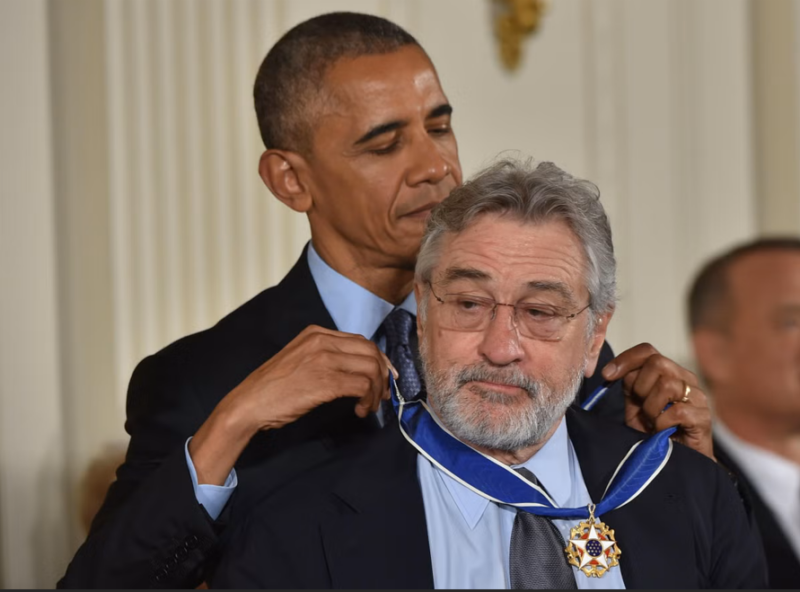
US President Barack Obama presents Robert De Niro with the Presidential Medal of Freedom, the nation’s highest civilian honor.
What Treatment Did Robert De Niro Undergo for Prostate Cancer?
Robert De Niro chose to undergo treatment for his prostate cancer involving a combination of medical interventions tailored to his specific diagnosis. While he has not disclosed the exact details of his treatment regimen, common approaches include surgery (such as radical prostatectomy) and radiation therapy.
Surgery and Radiation Therapy
Radical Prostatectomy involves the surgical removal of the prostate gland and some surrounding tissue. Expected outcomes are generally positive, with high five-year survival rates for localized prostate cancer, often near 100%. However, potential side effects may include urinary incontinence, erectile dysfunction, and changes in orgasm.
External Beam Radiation Therapy uses targeted radiation to destroy cancer cells. This non-invasive option can also lead to favorable outcomes, with a similar survival rate for early-stage cancers. Side effects may include fatigue, skin irritation at the treatment site, and urinary or bowel changes.
Both treatment options have their advantages and risks, and the choice often depends on factors like cancer stage, patient health, and personal preferences. Early detection is crucial, as it significantly improves the effectiveness of these treatments.
How Did Robert De Niro Overcome Prostate Cancer?
Robert De Niro demonstrated remarkable resilience and mental fortitude during his prostate cancer treatment, continuing to focus on his acting career, family life, and health advocacy. Despite his diagnosis, he remained active in film, stating,
“Life is about moving forward, not dwelling on what you can’t control.”
De Niro emphasized the importance of health awareness, urging men to prioritize regular screenings:
“I want to raise awareness about prostate cancer and the need for early detection.”
His commitment to balancing personal challenges with professional obligations, while engaging in advocacy, serves as an inspiration to many facing similar health issues.
Support from Family and Friends
Robert De Niro’s family and friends have played a crucial role in supporting him throughout his prostate cancer journey. The emotional backing of loved ones has been essential in helping him cope with the challenges of treatment. De Niro has often highlighted the significance of having a strong support network, noting that family provides a sense of stability and comfort during difficult times.
His children, including daughter Drena and sons Raphael and Julian, have been described as his source of strength. De Niro has mentioned how their presence and encouragement have helped him maintain a positive outlook, stating,
“They keep me grounded and remind me of what truly matters.”
Their unwavering support has allowed him to focus on recovery while continuing to engage in his career and advocacy work.
Additionally, close friends like Martin Scorsese and Al Pacino have provided emotional support, fostering an environment of camaraderie and understanding. De Niro has expressed gratitude for their friendship, emphasizing how these relationships help navigate the complexities of treatment.
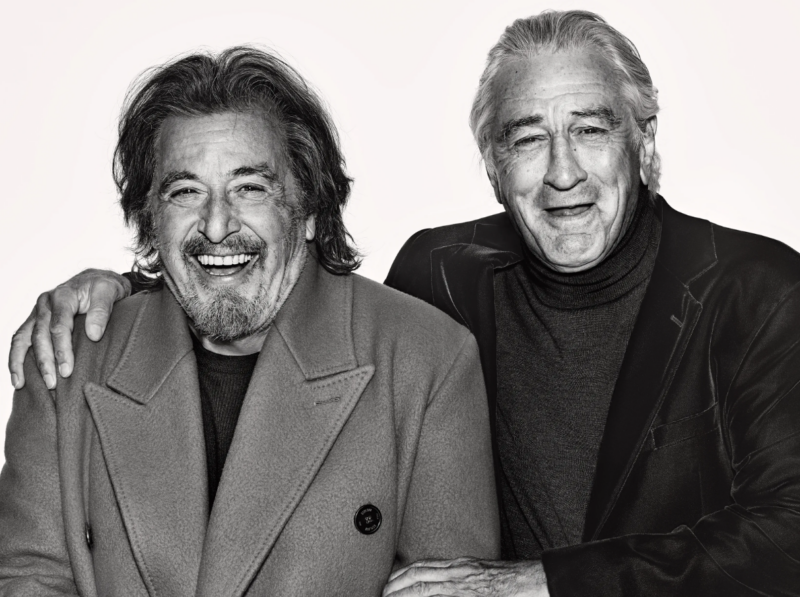
Robert De Niro with Al Pachino
Mental and Emotional Challenges
During his cancer treatment and recovery, Robert De Niro faced significant mental and emotional challenges, including fear, uncertainty, and the stress of navigating a serious health diagnosis. The emotional weight of such a journey can be daunting, but De Niro has managed to maintain strength and optimism throughout the process.
He acknowledged the initial shock of his diagnosis, admitting that grappling with fear of the unknown was difficult. However, De Niro’s resilience shone through as he focused on what he could control. He often emphasized the importance of maintaining a positive mindset, stating, “You have to stay strong and keep moving forward.” This proactive attitude has been crucial in helping him cope with the emotional toll of treatment.
De Niro found strength in his family and friends, using their support as a foundation for his emotional well-being. Engaging in his acting career also provided a sense of normalcy and purpose, allowing him to channel his energy into work he loves. He often remarked that staying busy kept his mind off the difficulties he faced.
How Did Advocacy and Public Awareness Help?
Robert De Niro has actively used his platform to raise awareness about prostate cancer, emphasizing the importance of regular screenings and early detection. Following his diagnosis, he engaged in public speaking and interviews, stating,
“I want to raise awareness about prostate cancer and the need for early detection.”
His involvement in film projects addressing health issues also helps to inform and inspire audiences. Through these efforts, De Niro has become a prominent advocate for prostate cancer awareness, encouraging men to prioritize their health.
Public Speaking and Advocacy
Robert De Niro has engaged in various public speaking events and advocacy efforts to promote prostate cancer awareness. For instance, he participated in the 2018 Prostate Cancer Foundation’s Annual Scientific Retreat, where he spoke about his personal experience and the importance of early detection. His presence at such events has helped to draw significant media attention to prostate cancer issues.
In interviews following his diagnosis, De Niro has consistently highlighted the necessity of regular screenings. His comments have resonated widely, influencing public health conversations by encouraging men to seek medical advice without hesitation. In a notable appearance on The Today Show, he emphasized that many men avoid discussing health concerns, stating, “It’s a conversation we need to have.”
Collaborations with Health Organizations
Robert De Niro has collaborated with several cancer research organizations and health institutions focused on prostate cancer prevention and treatment. Notably, he has partnered with the Prostate Cancer Foundation (PCF), where he has participated in events and initiatives aimed at raising awareness and funding for prostate cancer research. His involvement has helped shine a spotlight on the importance of early detection and innovative treatment options.
De Niro has also worked with the American Cancer Society, contributing to campaigns designed to educate the public about prostate cancer risks and the necessity of regular screenings. His participation in public service announcements and fundraising events has been instrumental in promoting awareness and encouraging men to prioritize their health.
Through these collaborations, De Niro’s efforts have significantly contributed to increasing public awareness about prostate cancer and directing funding toward crucial research. His high-profile presence has helped to destigmatize discussions around men’s health, fostering a culture where seeking help and information is encouraged.
What Is Robert De Niro’s Life Like After Cancer?
Since his prostate cancer diagnosis and treatment, Robert De Niro has resumed his acting career with vigor, participating in various film projects that highlight his enduring passion for the craft. His return to the screen includes roles in films such as “The Irishman” and “Killers of the Flower Moon,” showcasing his resilience and commitment to his art.
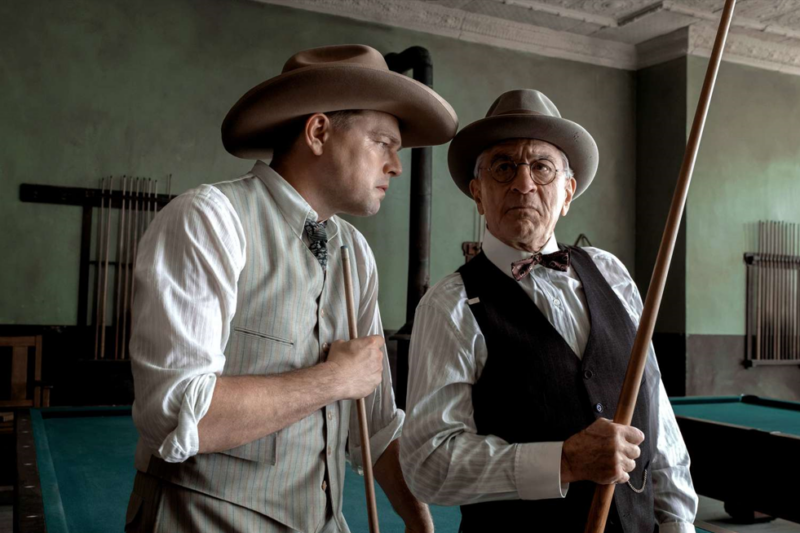
With Leonardo DiCaprio from scene of “Killers of the Flower Moon,” 2023
Ongoing Health Challenges
Post-treatment, Robert De Niro has faced some ongoing health challenges typical for prostate cancer survivors, including potential side effects such as fatigue, urinary issues, and changes in sexual function. These challenges can be common following treatments like surgery and radiation, which can affect quality of life.
What Causes Prostate Cancer?
Prostate cancer risk is influenced by genetic factors, age, hormonal imbalances, lifestyle choices, and environmental factors. Key risk elements include a family history of cancer, older age, higher testosterone levels, poor diet, and obesity. Geographic variations also suggest environmental influences. Prevention strategies involve maintaining a healthy diet, regular exercise, and weight management. Genetic testing and individualized screening are recommended for those with higher risk profiles.
Genetic and Hormonal Factors
Genetic and hormonal factors significantly influence prostate cancer risk. Men with a family history of the disease, particularly those with first-degree relatives diagnosed, are at a 2-3 times higher risk (American Cancer Society). Inherited mutations, such as in the BRCA2 gene, further elevate this risk, making affected men 2-3 times more likely to develop prostate cancer (National Cancer Institute). Genetic syndromes like Lynch Syndrome also contribute, with a lifetime risk of about 7-12% (Genetics Home Reference).
Hormonal factors play a critical role as well. Elevated testosterone levels are associated with increased prostate cancer risk, as high testosterone can promote cancer cell growth, though this relationship remains complex (Mayo Clinic). Additionally, variations in the androgen receptor gene, which regulates testosterone’s effects, are linked to heightened risk, with specific gene variants shown to modify susceptibility (Journal of Clinical Oncology).
Lifestyle and Environmental Factors
Lifestyle and environmental factors significantly impact prostate cancer risk. A high intake of red meat and processed foods is linked to a 20% increased risk of prostate cancer (American Institute for Cancer Research). In contrast, a diet rich in fruits, vegetables, and omega-3 fatty acids may help reduce this risk (Journal of the National Cancer Institute). Regular physical activity is associated with a 10-30% lower risk of developing prostate cancer (Journal of Clinical Oncology). Smoking increases the likelihood of aggressive prostate cancer, with smokers being about 30% more likely to develop it compared to non-smokers. Additionally, exposure to certain chemicals, such as pesticides, may elevate risk, though this area requires further research (Environmental Health Perspectives).
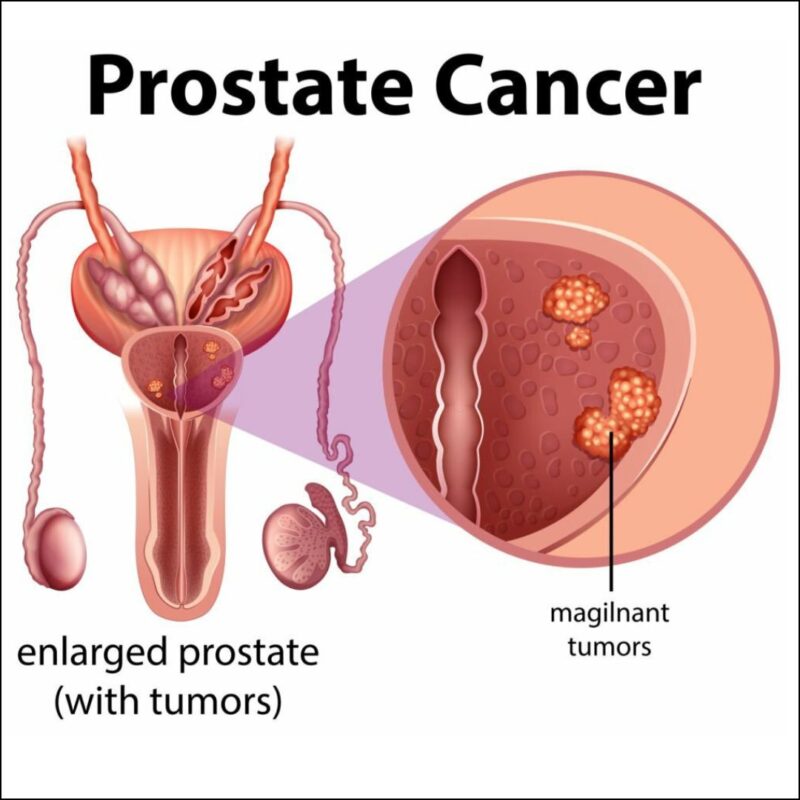
How Can Prostate Cancer Be Prevented?
Preventive measures for prostate cancer focus on regular screenings, lifestyle adjustments, and dietary changes. Routine medical tests, such as PSA (Prostate-Specific Antigen) tests, help detect cancers early. Quitting smoking and staying physically active are known to lower risk factors. Cancer research organizations recommend a diet rich in plant-based foods, while limiting alcohol and red meat, to reduce cancer incidence.
Regular Screenings
Regular screenings are essential for early detection, especially for men over 50 or those with a family history of prostate cancer. PSA tests measure a specific protein in the blood; elevated levels can indicate prostate issues, including cancer. Recognizing early symptoms, such as difficulty urinating, frequent urination (especially at night), or blood in the urine, is crucial. Early-stage prostate cancer often presents minimal symptoms, making regular screenings vital. Prompt medical consultation at the first sign of symptoms can lead to early diagnosis, improving treatment outcomes and reducing the risk of complications (American Cancer Society).
Lifestyle Changes
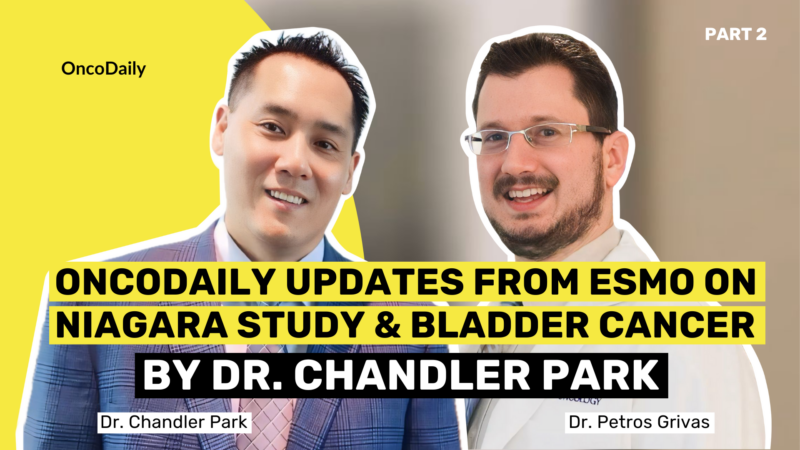
What is Robert De Niro’s most famous role?
While Robert De Niro has had many iconic roles, he is often best known for his portrayal of Travis Bickle in “Taxi Driver” and Jake LaMotta in “Raging Bull,” both of which earned him critical acclaim and solidified his status as a legendary actor.
Is Robert De Niro married?
Robert De Niro has been married twice. He was first married to Diahnne Abbott from 1976 to 1988, and he is currently married to Grace Hightower, with whom he has been in a long-term relationship.
Has Robert De Niro won any Academy Awards?
Yes, Robert De Niro has won two Academy Awards for Best Actor: one for “Raging Bull” in 1981 and another for Best Supporting Actor in “The Godfather Part II” in 1975.
What type of cancer did Robert De Niro have?
Robert De Niro was diagnosed with prostate cancer
When was Robert De Niro diagnosed with cancer?
De Niro publicly revealed his diagnosis in 2023.
How did Robert De Niro find out he had cancer?
He discovered his prostate cancer through routine screenings and medical check-ups.
What treatment did Robert De Niro undergo for his cancer?
While specific details of his treatment have not been extensively shared, he has discussed undergoing surgery as part of his treatment plan.
How has Robert De Niro advocated for cancer awareness?
De Niro has used his platform to raise awareness about prostate cancer, emphasizing the importance of early detection and regular screenings.
What are Robert De Niro’s current health status and lifestyle after cancer?
After treatment, De Niro has resumed his acting career and continues to promote healthy lifestyle choices while managing any ongoing health challenges.
Written by Aharon Tsaturyan, MD
-
ESMO 2024 Congress
September 13-17, 2024
-
ASCO Annual Meeting
May 30 - June 4, 2024
-
Yvonne Award 2024
May 31, 2024
-
OncoThon 2024, Online
Feb. 15, 2024
-
Global Summit on War & Cancer 2023, Online
Dec. 14-16, 2023
